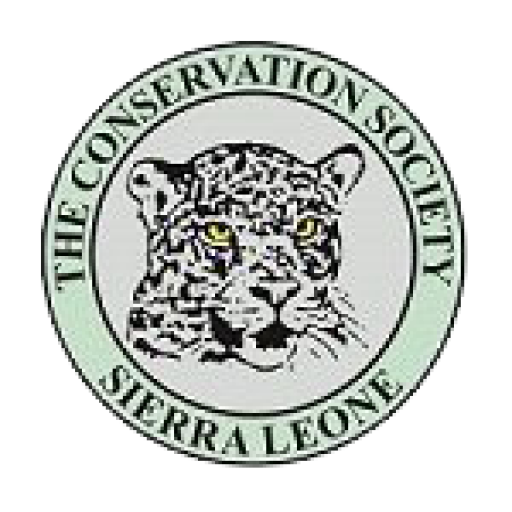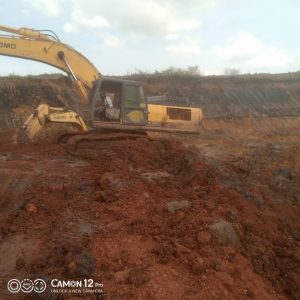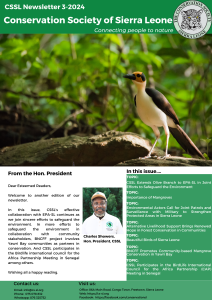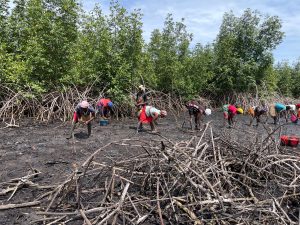On Monday, 16th January 2023, the public was invited to the third Public Disclosure of the Draft Environmental and Social Health Impact Assessment and the Engineering Feasibility Studies of the proposed Fish Harbour Development Project at Black Johnson, Western Rural District, Sierra Leone.
Two public disclosures already have been taken place in the previous days at the community of Black Johnson and in Waterloo.
The conference room of the Ministry of Fisheries and Marine Resources was packed until the last seat when the Deputy Minister gave his opening statement. He stated that since the government of Sierra Leone started the project, all official procedures including consultations of stakeholders according to national and international laws are followed. “Especially all procedures and steps regarding the environment are ensured. We are taking all efforts to minimize and mitigate consequences on people and environment.” Says the Deputy Minister. “We are working with an independent firm to get neutral recommendations.” The following statement was presented by the head of EPA. He explained that the public should have its say. “The role of government is to decide whether the impact is acceptable or not.”
Prof. Andrew C.M. Baio from Black Eagle Sierra Leone, presented the methodology and the outcomes of the survey undertaken. The full report can be accessed and read here:
After the statements and the presentation of the document the floor was open for questions and answers. Different concerns were raised from civil society such as the Human Rights Commission and Christian Relief Services. A resident of Black Johnson, Mme Jane Aspen, expressed her position as they have not been consulted. She also stated that the Constitution of Sierra Leone ensures that government can acquire private land if it is from major interest for the country but that the last decision has to be taken by a special established court. That has not happened yet. The questions from international organisations like GIZ from Germany were related to missing numbers about expected positive outcome of the project like jobs created, revenue for the government, tourists attracted and others. A big concern was the negative impact on eco-tourism in Sierra Leone as the coastline and with it the beaches will be destroyed. Apart from that the representative from GIZ questioned the establishment of an aquamarine park. As the international trend is to close these kinds of parks and to protect animals in their natural habitat.
The Conservation Society of Sierra Leone (CSSL) also raised several concerns regarding the construction of a fish harbour at Black Johnson / Whale Bay. Abdul K. Dumbuya spoke out for the Western Area Peninsula Forest National Park. Even though the fish harbour itself will be outside the protected area, the increasing number of inhabitants, businesses and improved road access will lead to higher pressure on the protected forest. The representative from GIZ supported that view in her statement. Further voices from CSSL draw attention to the big picture along the coastline. The destruction of the marine and coastal eco-system of Black Johnson will have an immense negative impact on the other beaches along the Western Area Peninsula with extreme consequences for tourism and coastal communities. There are already landing sites for the processing and cooling of fishes along the coast which are not in use. One of the questions which was raised by CSSL was how it will be ensured that this time it will be different. The environment should not be destroyed for any construction which later will not be used because of different issues. Another concern raised by CSSL was that the destruction of breading areas of fishes has to be well thought about. There are many tuna along the coast of Sierra Leone because they find a lot of food. This food is breeding in the mangroves and bays of the Sierra Leonian cost. If the breeding areas are destroyed the tuna will be gone after a while also.
CSSL has many more concerns about the construction of a fishing harbour at this rich biodiversity site. But one concern addressed during the meeting for which no answer was offered is the one about the endangered species living in the bay and visiting it. The report names several red listed animals, the most well-known are two species of sea turtles. What will happen to these animals which are under international protection? A resettlement plan and compensation payments will not work in their case.
Even though we as CSSL know that Sierra Leone needs development, and a fish harbour would be a great benefit for the people and the economy of the country, CSSL is not sure whether Black Johnson is the best place for it. The video animation presented at the meeting shows a big area of flat land where the harbour and its accompanying facilities will be constructed. The area of Black Johnson and Whale Bay is very hilly. One part of the harbour will be constructed inside the water. We don´t know what negative consequences this will bring for ecosystems and fishes along the coast. We only know that maritime ecosystems are very sensitive and need to be treated very carefully. All of this means massive destruction and reconstruction of the natural surface is necessary. Another issue is that the bay is not very deep. Everyone who ever tried to swim at Whale Bay during low tide will know that it is not easy to reach deep water. How will big tuna vessels be able to reach the harbour?
Two days after the meeting there were reports from people from Black Johnson, that the Ministry of Lands came to destroy homes of people. Today people from the Ministry visited Black Johnson to mark the land for the fishing harbour. Officially there has not been any decision taken yet about whether the harbour will be built or not.
The Conservation Society of Sierra Leone is sure that the Environmental Protection Agency (EPA) will take all concerns into consideration and will take a decision which reflects their concern for the protection of our precious environment. We don´t protect it for us – but for our children and future generations! CSSL hopes that Black Johnson and its amazing sea turtles, friendly dolphins, beautiful birds, timid pangolins, and wonderful Mangroves can still be saved. If we loose Black Johnson, we will feel it on the whole Peninsula, not only at Black Johnson itself.



